- Karachi
- Lahore
- Islamabad
- Leads, UK
- Reading, UK
- Quebec, Canada
Understanding Court Marriage in Pakistan: A Guide to Court Marriage
Mohsin Ali Shah, Chairman Qanoon Group, Pakistan
Court Marriage in Pakistan-An Introduction
Court marriage in Pakistan serves as a legal alternative to traditional marriage ceremonies, offering couples a streamlined process for entering into a marital union. This form of marriage holds significant importance in contemporary society due to various social and legal dynamics. Couples may choose court marriage for several reasons, including the desire for convenience, the need for legal recognition, or to mitigate family disputes that often accompany traditional wedding practices.
One of the primary advantages of opting for court marriage is the reduction of elaborate ceremonies, which can be both time-consuming and financially burdensome. By allowing couples to marry in a legal setting without the need for extensive rituals, court marriage provides a quick and efficient pathway to matrimony. Moreover, it grants the necessary legal recognition that is essential for a marital relationship, ensuring that the rights and responsibilities of both parties are upheld under the law.
Additionally, court marriage can be particularly appealing for couples facing familial opposition or societal restrictions that may hinder their union. In many cases, individuals may find themselves in situations where their choice of partner is not accepted by their families due to various reasons, such as differing backgrounds, caste, or religious beliefs. In these instances, court marriage can serve as a means of circumventing potential conflicts, allowing couples to formalize their relationship on their own terms.
As society evolves and acceptance of diverse relationship dynamics increases, the prevalence of court marriage in Pakistan continues to rise. It not only reflects the changing perspectives on love and partnership but also underscores the desire for autonomy in personal choices. The increasing recognition of court marriages is indicative of a broader trend towards prioritizing individual preferences over traditional norms.
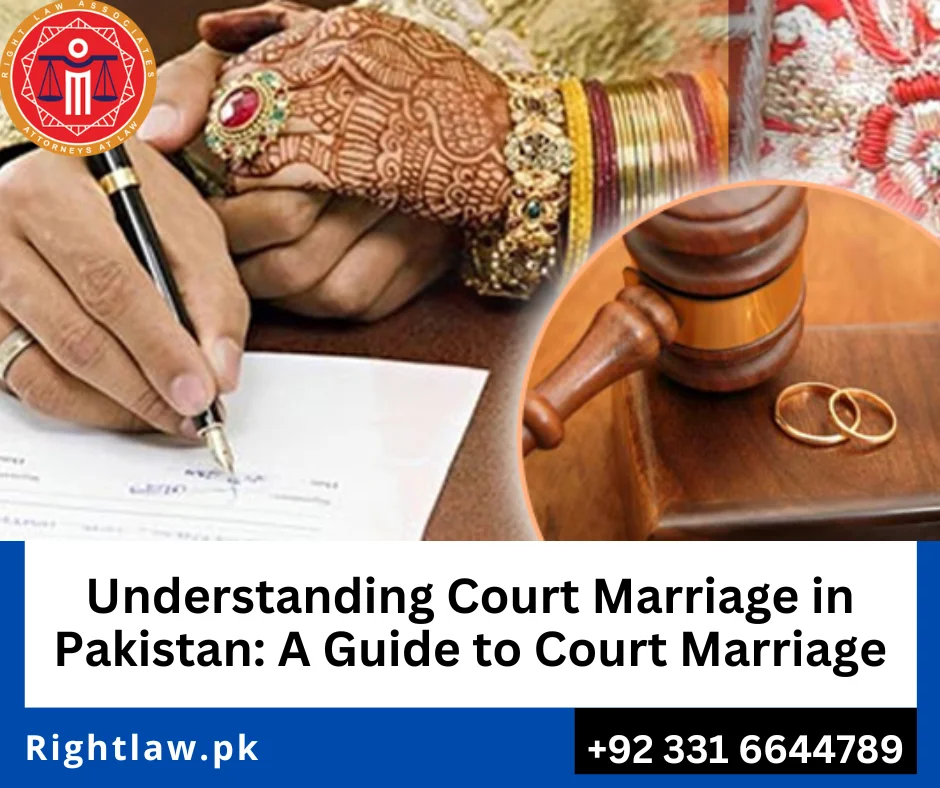
Requirements for Court Marriage in Pakistan
Entering into a court marriage in Pakistan entails fulfilling specific legal requirements that ensure the legitimacy of the union. Primarily, the law stipulates a minimum age requirement for marriage; men must be at least 18 years old, while women must be at least 16. This age threshold is set to protect the rights of individuals and to promote responsible marital choices.
Consent is another critical aspect of court marriage. Both parties must voluntarily agree to the marriage without any form of coercion or undue influence. This principle aims to uphold personal autonomy and signifies that both individuals are entering into the union of their own free will, which is vital in Islamic law as well as civil law. Documentation to prove identity is also essential; couples are typically required to present their national identification cards or other valid identification documents to substantiate their identities during the marriage registration process.
In addition to age and consent, other legal conditions must be observed. For instance, if either party has been previously married, they must provide proof of divorce or the death certificate of the former spouse. This provision is implemented to avoid complications such as polygamy, which is regulated under specific legal frameworks in Pakistan. Another important condition is that the couple should not be closely related by blood, as such marriages are prohibited under both civil and religious laws.
Potential couples seeking a court marriage in Pakistan should ensure that they meet these requirements, as failure to do so can result in legal complications. Familiarization with the necessary documentation and processes will help facilitate a smooth and lawful court marriage experience in Pakistan.
Documents Required for Court Marriage in Pakistan
When considering court marriage in Pakistan, it is essential to prepare the necessary documentation to ensure a smooth process. The following is a detailed list of required documents that couples must present to the court.
Firstly, both parties must provide valid identification documents. For Pakistani citizens, this typically includes a Computerized National Identity Card (CNIC). In the absence of a CNIC, other forms of identification, such as a valid passport or a government-issued ID card, can be presented. Foreign nationals need to have their passports and residency visas, if applicable, to verify their legal status within the country.
In addition to identification, proof of residence is crucial. This can be fulfilled by submitting documents such as utility bills, rental agreements, or any official document that clearly states the couple’s current address. This requirement helps the court confirm that both parties are legally residing at the stated address.
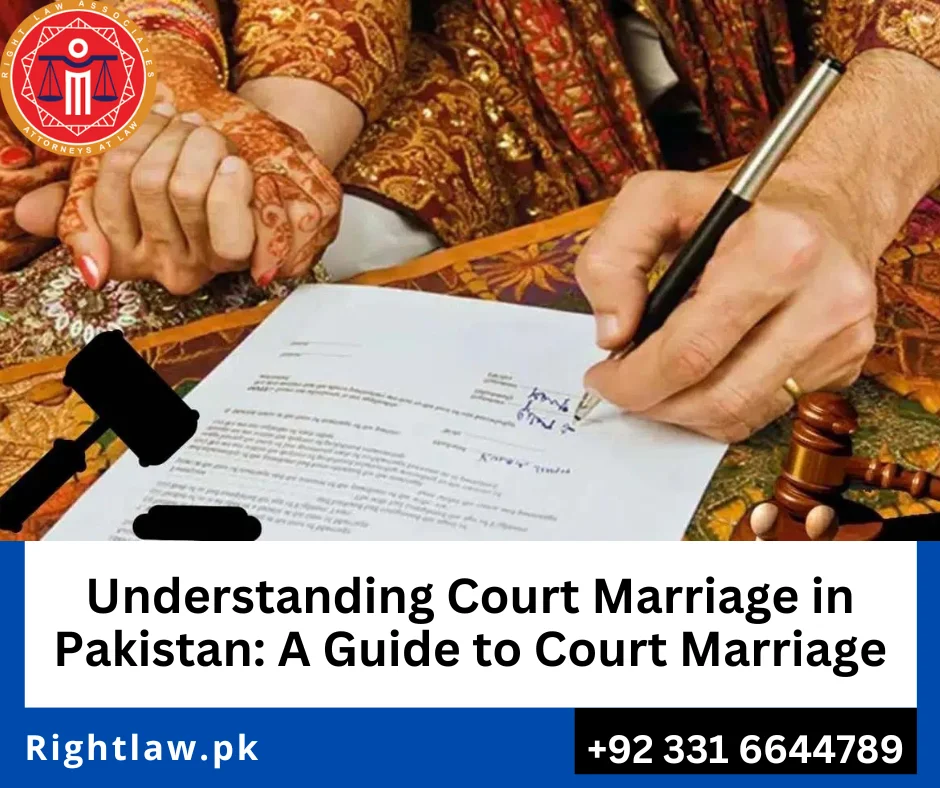
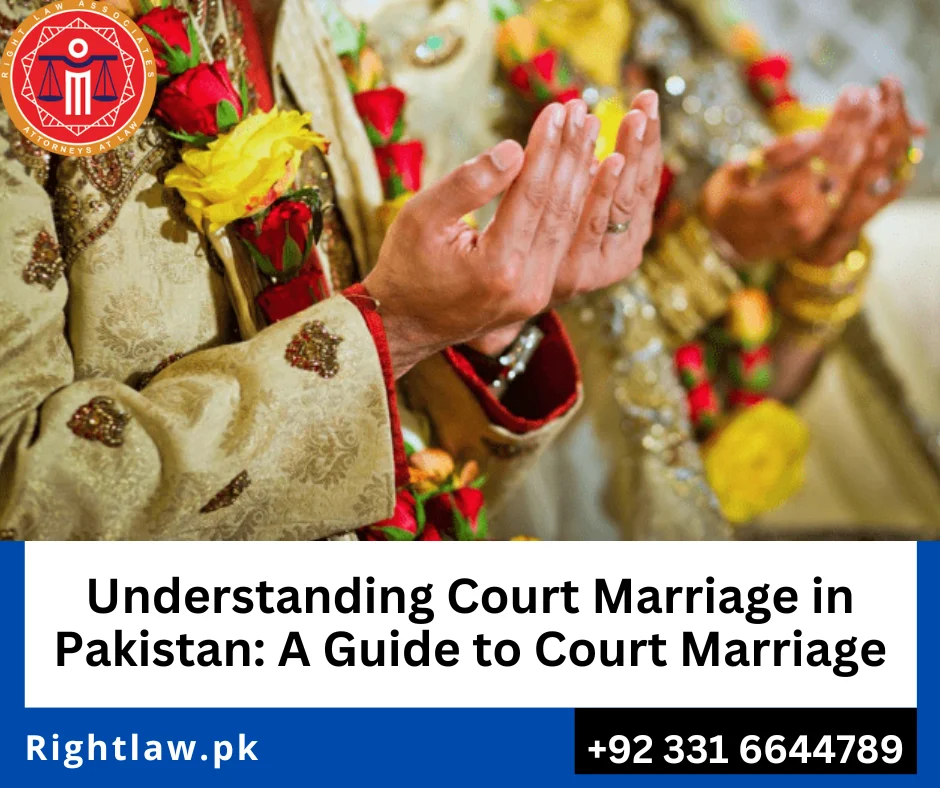
Couples planning to undergo court marriage in Pakistan are also required to submit several passport-sized photographs, typically around four to six. These photographs must be recent and comply with the specific guidelines set by the court. It is advisable to check ahead regarding the particular format needed to avoid any issues on the day of the marriage registration.
Moreover, additional paperwork may be required by the local court, including affidavits or declarations that attest to the parties’ marital status, namely whether they are single or divorced. If either party has been previously married, the relevant divorce decree or death certificate of the deceased spouse must also be provided. To facilitate the application process, it may be beneficial to consult with a legal expert who specializes in family law in Pakistan.
In conclusion, collecting the correct documentation is imperative for a successful court marriage in Pakistan, ensuring that all legal requirements are duly met.
The Court Marriage Procedure in Pakistan
The procedure for conducting a court marriage in Pakistan is systematic and designed to ensure that all legal requirements are met. To initiate the process, both parties interested in entering into a court marriage must first gather the necessary documentation. Essential documents typically include national identity cards, birth certificates, and, if applicable, divorce decrees or death certificates of previous spouses.
Once the documentation is in order, the couple must submit an application for court marriage at the local office of the registrar. This application is a formal request to register the marriage, and it should be filled out completely and accurately. The registrar’s office will verify the provided documents to ensure their authenticity and compliance with legal requirements. It is advisable to visit the office together, as personal identification and presence are often mandatory during the application process.
Following the submission, the couple will be required to undergo an interview conducted by the registrar or an appointed official. This interview serves as a means to confirm the consent of both parties to enter the marriage willingly. During this meeting, questions regarding the couple’s backgrounds, intentions, and understanding of their marital rights may be posed to ensure transparency and mutual agreement.
Upon successful completion of the interview, the marriage registration process continues with the signing of the marriage contract, known as the Nikah Nama. This document is critical, as it formally acknowledges the union according to Islamic law and local regulations. Once signed, the registrar will issue a marriage certificate, which serves as the official record of the court marriage in Pakistan. The entire process emphasizes the importance of legal formalities, presenting a structured pathway for couples wishing to marry outside traditional religious ceremonies.

Popularity of Court Marriage in Pakistan
The phenomenon of court marriage in Pakistan has witnessed a significant rise in popularity, particularly among young couples. This trend is largely driven by the changing social dynamics and attitudes toward marriage, as well as the influence of education and urbanization. The traditional concept of marriage, which often involves elaborate ceremonies and extended family involvement, is gradually being replaced by a more streamlined and personal approach. Couples now seek the convenience and simplicity that court marriages offer.
Education plays a pivotal role in this paradigm shift. As more individuals pursue higher education, especially in urban settings, there is a growing emphasis on personal choice and autonomy in marital decisions. Young men and women are increasingly inclined to prioritize mutual consent and compatibility over familial arrangements. This is leading to a culture where court marriage is seen as a legitimate and progressive choice, empowering individuals to assert their preferences in the institution of marriage.
Moreover, urbanization has introduced a fast-paced lifestyle that values efficiency. In many urban areas, the formal procedures involved in traditional marriages can seem cumbersome and time-consuming. Court marriage provides an expedited alternative that appeals to busy couples, enabling them to formalize their relationship without the extensive preparations typically associated with conventional weddings.
Additionally, the increasing visibility of successful court marriages in society is helping to shift perceptions. As young couples who choose this path share their stories and experiences, others are encouraged to consider court marriage as a valid option. It is becoming clear that this alternative mode of marriage is not only socially acceptable but is also evolving into a symbol of love, commitment, and independence in contemporary Pakistani society.
Legal Implications of Court Marriage in Pakistan
Court marriage in Pakistan provides a legal framework for couples who wish to formalize their relationship without undergoing traditional customs and ceremonies. Under the Muslim Family Laws Ordinance of 1961 and the Special Marriage Act of 1872, court marriages are recognized by law, offering married couples a defined set of rights and responsibilities. This legal recognition allows spouses to approach the courts for adjudication in familial matters, thus establishing a formal avenue for dispute resolution.
The fundamental rights that a couple obtains through court marriage include the right to inheritance, property ownership, and legal status when it comes to taxation and social welfare benefits. Furthermore, in cases of divorce or separation, court marriage grants the couple the right to file for dissolution with the support of legal protocols. Such legal avenues effectively enhance the protection of both parties against arbitrary claims and societal stigmas that can arise from informal unions.
However, while court marriages are recognized, couples may face challenges regarding the acceptance of their marriages within certain societal contexts. There are instances where families or communities may dispute the legitimacy of a court marriage, deeming it inadequate compared to traditional marriage. This social stigma can lead to difficulties in establishing family ties and can complicate matters like the registration of children born to couples who opted for court marriage in Pakistan.
Another potential issue lies in the documentation required to validate a court marriage. To ensure legitimacy, couples must acquire a marriage certificate from the relevant authority. Failing to do so might result in challenges regarding the legal standing of their marriage, especially if proof is sought in times of need, such as in inheritance cases or health-related emergencies. Therefore, an understanding of the legal implications of court marriage in Pakistan is crucial for couples wishing to navigate this path effectively.
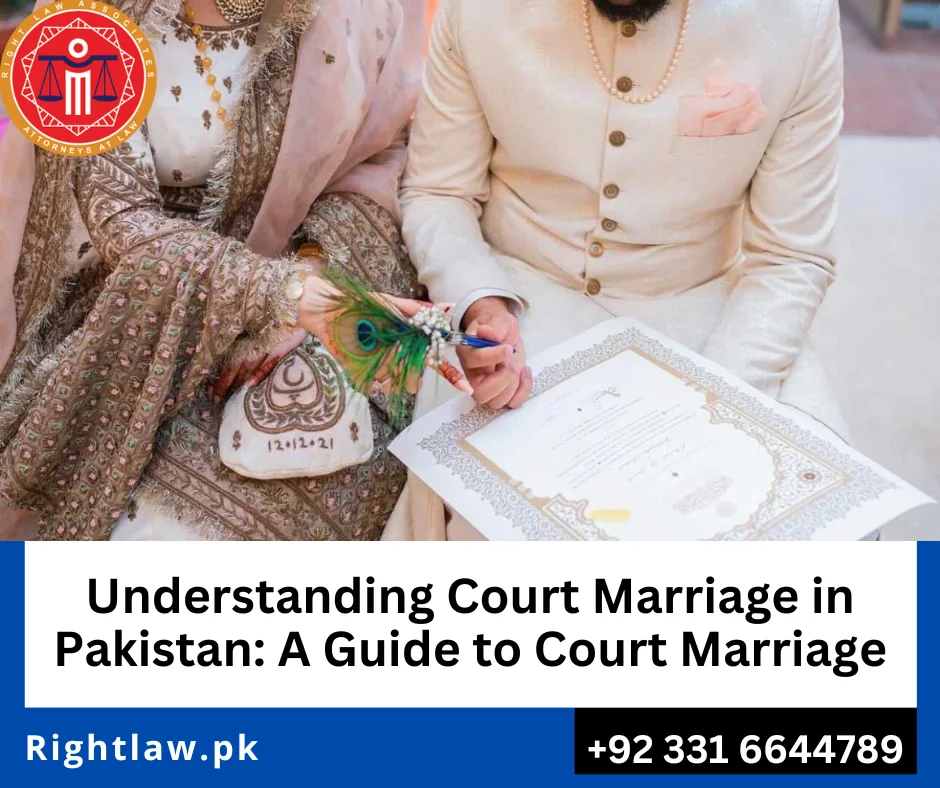
Court Marriage and Religious Considerations
Court marriage in Pakistan provides a legal framework for individuals wishing to marry outside traditional religious customs. This practice has become increasingly relevant in a country where diverse religious beliefs frequently intersect with personal and legal matters. Various religious communities in Pakistan hold differing views regarding the legitimacy and acceptability of court marriages. For instance, while the Muslim community may predominantly adhere to Islamic rites before a marriage is acknowledged, court marriage offers a secular alternative that some couples find more suitable.
Christian, Hindu, and other religious couples also face unique challenges. For many, adhering to the rites and customs prescribed by their religious traditions is paramount. However, civil procedures through court marriage can sometimes create friction. For instance, Hindu couples may face societal pressures if they choose to marry at a courthouse rather than following traditional ceremonies. Similarly, Christian beliefs often emphasize the sanctity of marriage performed by a priest, leading to scrutiny of secular marriages conducted through the legal system.
The legal structure of court marriage in Pakistan also brings forth potential conflicts. Some traditional interpretations may reject the legitimacy of such a union if it bypasses customary religious rites. Moreover, the societal perception of court marriage can be mixed, leading to social stigma against those who opt for this route. Thus, the individuals must carefully navigate both the legal and religious dimensions of their decisions, ensuring they understand the implications of their choice.
In summary, the intersection of court marriage and religious beliefs in Pakistan reveals a complex landscape. As individuals increasingly turn to legal pathways for marriage, it becomes crucial to acknowledge and respect the diverse viewpoints that exist within various religious communities.
Future of Court Marriages in Pakistan
The landscape of court marriage in Pakistan is on the cusp of transformation influenced by various social, legal, and cultural dynamics. As society continues to evolve, so too do public perceptions toward marriage practices, including court marriages, which are increasingly viewed as an alternative to traditional marriage ceremonies. The growing acceptance of individual choice in matters of marriage signifies a shift from conventional familial pressures toward a more personal approach, which court marriage exemplifies.
One of the significant factors contributing to the future of court marriages in Pakistan is the imminent legal reforms aimed at streamlining the process. The government is reportedly considering various measures to simplify the legal framework surrounding marriage registration. This includes eliminating bureaucratic hurdles that often delay or complicate the court marriage process. Such reforms would not only facilitate easier access for couples but also help in formalizing relationships in a country where legal recognition is crucial.
As public attitudes evolve, the acceptance of court marriages continues to grow, particularly among younger generations who prioritize personal freedom and autonomy over traditional mandates. This generational shift is likely to encourage more couples to opt for court marriages as a viable and legitimate form of union. Additionally, awareness campaigns focused on educating individuals about their rights under Pakistani law could bolster the popularity of court marriages, further integrating them into the social fabric.
With the potential for legal reforms and changing societal values, the future of court marriages in Pakistan appears promising. As individuals increasingly seek the autonomy to define their relationships, court marriages might become more prevalent, reflecting a broader acceptance of diverse marital choices in the years to come. The roadmap ahead indicates that court marriage will not only endure but possibly thrive amidst these changing landscapes.
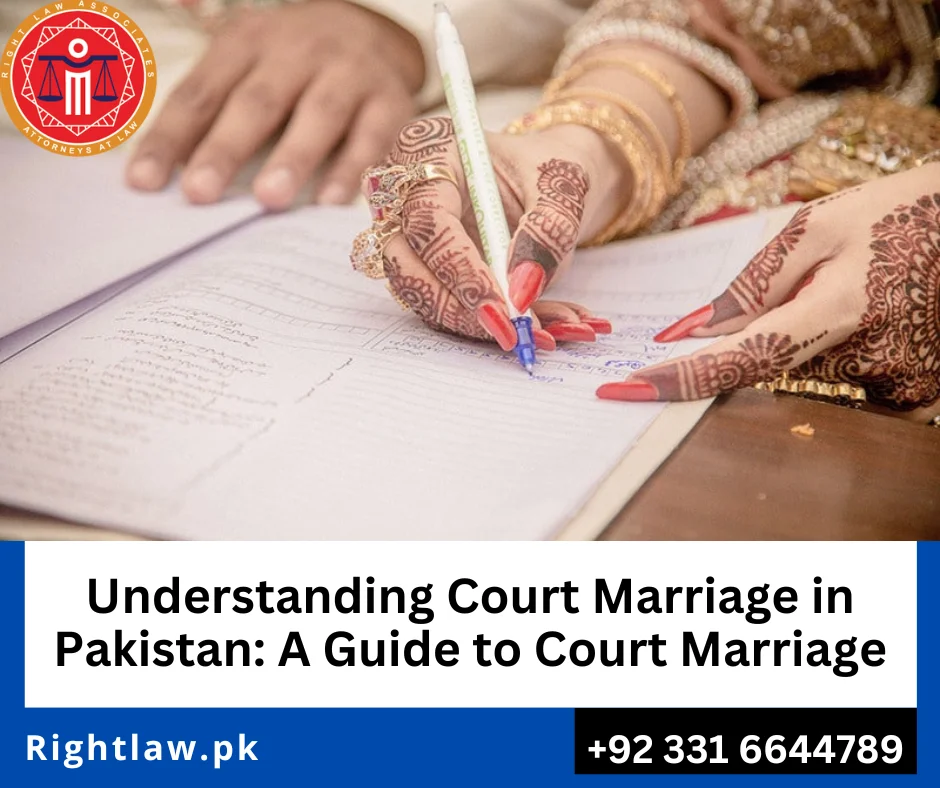
Conclusion: Embracing Change in Marriage Practices
Throughout this guide, we have delved into the various aspects of court marriage in Pakistan, shedding light on its significance amidst changing societal norms. The traditional marriage practices that have long been a cornerstone of Pakistani culture are gradually being complemented by a more modern approach to marital unions. Court marriage offers couples an alternative that prioritizes legal recognition and personal choice, reflecting the evolving perspectives on relationships and partnerships.
The procedural simplicity and legal advantages associated with court marriage have been instrumental in promoting its acceptance. For many, this method of matrimony provides an expeditious pathway free from the elaborate customs and rituals traditionally involved in weddings. Particularly for those who may face family opposition or social stigma, court marriage in Pakistan presents a practical solution that allows for a union based on mutual consent and love, rather than societal expectations.
As we move forward, it is essential for couples considering marriage to weigh the implications of their choices, whether opting for a conventional wedding or a court marriage. Understanding the legal framework and the rights that come with court marriage can empower individuals, ensuring that they embark on their marital journey with a clear understanding of their responsibilities and rights. In this constantly changing landscape, embracing court marriage could signify a progressive step towards acceptance of diverse marital practices that align with contemporary values.
In conclusion, as societal attitudes towards marriage continue to evolve, court marriage in Pakistan stands as a testament to the changing practices within the country. By acknowledging and understanding this modern approach, couples can make informed decisions that respect both their personal values and legal rights, paving the way for a future where love and choice take precedence.
Legal Services
- Divorce Law
- Child Custody
- Family Law
- Financial Law
- Civil Legalation
Syed mohsin Ali Shah
Phone : +92316-6644789
Let's Connect
- 0333 1127835
- [email protected]
- M-51, M-52, Muneer Mobile Mall, Near Perfume Chowk Jauhar Chowrangi, Block 17, Gulistan-e-Jauhar, Karachi, Pakistan.
- Suite No. 5, 2nd Floor, Laraib Centre, Mangla Road, Karachi Company, G-9 Markaz, Islamabad Pakistan
-
NADRA Divorce Certificate Services in Pakistan
-
NADRA Birth Certificate Services in Pakistan
-
Court Marriage with Full Privacy Assurance
-
Court Marriage for Couples Seeking Legal Union
-
Court Marriage in Pakistan: Court Marriage Process & Fees
-
Court Marriage: Confidential & Hassle-Free Solutions
-
Trend of Court Marriage in Pakistan: Court Marriage's Reasons
-
Court Marriage Services in Karachi, Lahore, Islamabad, and Rawalpindi
-
Understanding Court Marriage in Pakistan: A Guide to Court Marriage
-
Best Family: What Makes a Family Truly Great
-
Divorce Papers in Pakistan: Divorce Deed and NADRA Divorce Certificate
-
Court Marriage in Pakistan: Procedure and Fees
-
Court Marriage in Lahore: Our Court Marriage Service in Lahore
-
Nikah Khawan and Nikah Registrar Services in Karachi, Pakistan
-
Family Law in Pakistan-The Muslim Family Law Ordinance 1961
-
Understanding Online Nikah: The Crucial Roles of Nikah Khawan and Nikah Registrar
-
Nikah Khawan and Nikah Registrar Services in Pakistan
-
Lawyers Help for Court Marriage Procedure in Karachi
-
Online Marriage in Islam: Muslim Online Marriage
-
Court Marriage in Pakistan—Legal Procedure, Social Realities, and Support for Couples
-
Court Marriage, Online Marriage, and Nikah-Khawan Services in Islamabad & Rawalpindi
-
Online Marriage/Nikah | Online Marriage/Nikah Services In and From Pakistan
-
Nikah Khawan/Qazi Services and Fees in Karachi-Lahore-Islamabad/Rawalpindi-Faisalabad-Multan
-
Court Marriage Pakistan | Court Marriage Services-Process-Fees in Pakistan
-
Embracing Online Marriage Services Across Karachi, Lahore, Islamabad, and Rawalpindi, Pakistan
-
Family Law | Expert Divorce Lawyers For Khula/Talaq (Divorce) in Karachi, Islamabad/Rawalpindi & Lahore, Pakistan
-
Guardianship Lawyers in Karachi, Lahore, & Islamabad Pakistan
-
Child Custody Lawyers in Karachi, Lahore, & Islamabad-Pakistan
-
English Nikah Nama | English Nikah Nama Available in Karachi
-
Family Law | Expert Divorce Lawyers For Khula/Talaq (Divorce) in Karachi, Islamabad/Rawalpindi & Lahore, Pakistan
-
Nikah Nama Urdu/English Available in Karachi
-
Nadra Marriage Registration Service | Marriage Registration Certificate
-
Marriage Registration | Nadra Marriage Certificate-Karachi
-
Nikah Nama Services with Nikah Nama English & Urdu
-
Nikah Registration | Nikah Registration Services-Pakistan
-
What is Child Guardianship
-
Top Rated Advocates for Family Law Matters
-
B Form NADRA: Importance of B Form in Pakistan
-
Nadra B Form in Pakistan
-
Is Court Marriage Legal in Pakistan
-
Child Maintenance Advocates in Karachi
-
Consumer Rights Advocates in Karachi
-
Best Leady Lawyer Expertise as a Family Court Lawyer
-
Online Nikah Marriage In Pakistan
-
Business Corporate lawyers in Pakistan
-
Criminal Lawyers in Karachi | Lahore | Islamabad Rawalpindi | Pakistan
-
Understanding Business Law Corporate Lawyers Services in Pakistan
-
Online Marriage Technology in Modern
-
Court Marriage Professional Lawyers in Lahore
-
Court Marriage in Pakistan and Civil Marriage: Right Law Firm
-
Property Lawyers in Pakistan
-
Property Lawyers Expert in Pakistan
-
Minimum Wage in Pakistan
-
Property Disputes a Comprehensive Guide
-
Child Adoption Procedure & Services in Pakistan
-
Legally Valid Online Nikah, Your Love Story with Online Marriage
-
Online Nikah Excellence Pioneering Legally Sound Online Marriage
-
Court Marriage the Effortless Formality
-
Court Marriage in Pakistan-No.1 Court Marriage Service in Karachi
-
Navigating the Path to Legal Unions, Court Marriage in Pakistan
-
Court Marriage, Empowering Personal Choice and Freedom
-
Trusted Court Marriage Law Firm
-
Court Marriage a Journey Court Marriage in Pakistan
-
Power of Nikah Certificates
-
Nikah Certificates-Legality in Pakistan
-
Adoptions and Adoptive Families in Pakistan
-
Court Marriage in Pakistan A Comprehensive Guide
-
<strong>Tax Lawyer Mohsin Ali Shah</strong>
-
Civil Lawyers The Importance of Evidence in Civil Cases-Expert Tips for Civil Lawyers
-
Can There Be Objections to a Public Party Following a Court Marriage.
-
Court Marriage Making Love Officially Recognized Via Court Marriage
-
Court Marriage, Civil Marriage & Online Nikah in Pakistan
-
Misyar Marriage Nikah Misyar Facts About Misyar Marriages
-
Online Nikah and Online Marriage in Pakistan
-
The government of Pakistan amended the Civil and Criminal Law to bring reforms in Justice System
-
Child Adoption & Guardianship in Pakistan
-
Restitution of Conjugal Rights
-
Difference between Divorce Talaq and Khula:
